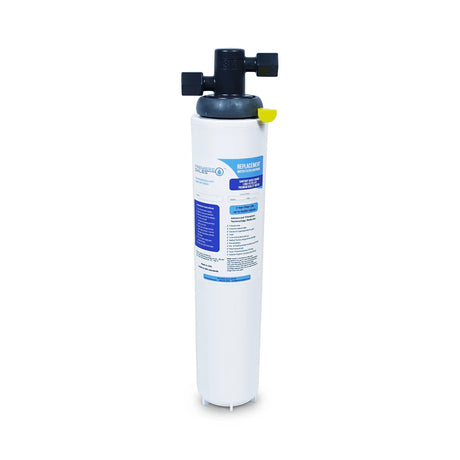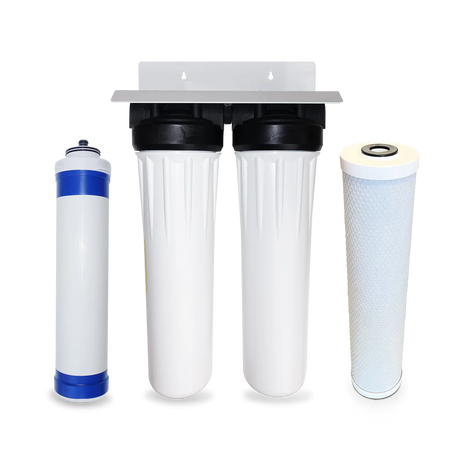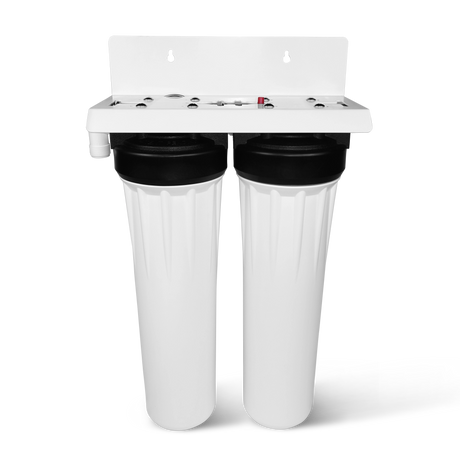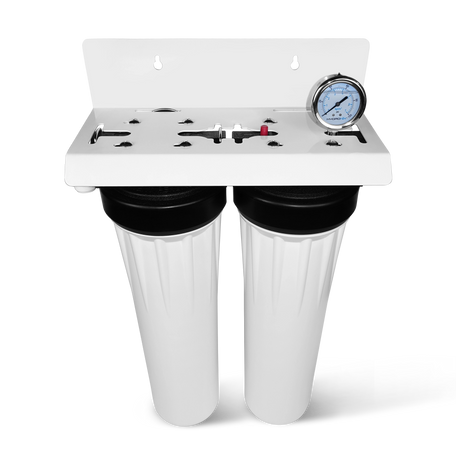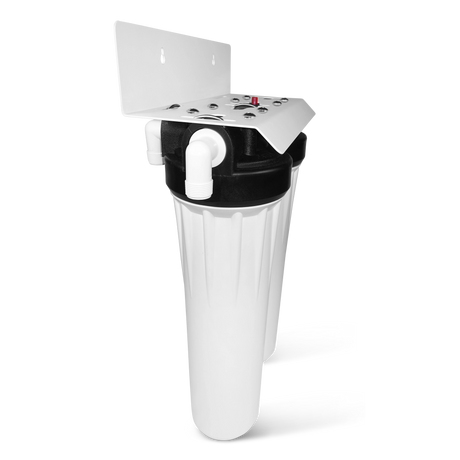Why Does My Water Smell? Common Causes of Water Odor & How to Fix It

If your water smells bad, you're not alone - odors in tap or well water are a common issue that affects millions of homeowners. Whether it's a rotten egg smell, chlorine odor, or something musty, smelly tap water can be both unpleasant and concerning. The good news is, most water odors are easy to diagnose and fix once you understand what's causing them.
In this comprehensive guide, we'll walk you through troubleshooting water odor issues, identify the most common causes of smelly water, and provide practical solutions to restore fresh-tasting water to your home.
Common Causes of Smelly Water
The key to fixing water smell issues is identifying the specific type of odor you're experiencing. Here are the most common water smells and their likely causes:
Sulfur Smell in Water (Rotten Egg Odor)
The distinctive hydrogen sulfide gas creates a rotten egg odor that's most common in well water but can also occur in municipal water systems. This sulfur smell develops when:
- Bacteria in your well or water heater interact with sulfur compounds
- Your hot water heater's anode rod is deteriorating
- There's bacterial growth in your plumbing system
Solutions for sulfur smell in water:
- Replace your water heater's anode rod
- Shock chlorination of your well system
- Install a whole house water filter designed for hydrogen sulfide removal
- Consider professional well cleaning and disinfection
Chlorine Smell in Tap Water
A strong chemical, swimming pool-like odor typically indicates that your municipal water utility is using higher levels of chlorine for disinfection. While chlorine makes water safe to drink, the bleach smell can be off-putting.
How to remove chlorine odor from water:
- Install activated carbon filters at point-of-use locations
- Use a whole-house carbon filtration system
- Let water sit in an open container for several hours to allow chlorine to dissipate naturally
Sewage or Fecal Smell in Water
If your water smells like sewage or has a fecal odor, this might be coming from your drain rather than the water itself. However, true sewage smells in water indicate serious bacterial contamination issues.
Diagnosing sewage odors:
- Fill a glass with water and smell it away from the sink
- If the smell persists in the glass, contact a water quality professional immediately
- If the smell only occurs at the faucet, clean and disinfect your drains
Musty or Moldy Water Smells
A musty, moldy, or mildew smell often indicates bacterial growth or stagnant water issues. This odor can develop in:
- Water filters that need changing
- Stagnant water in old pipes
- Well water systems with organic contamination
Fixing musty water odors:
- Replace water filter cartridges regularly
- Flush your plumbing system
- Clean and disinfect your well system
- Install ultrafiltration for bacterial control
Fishy Smell in Water
Water that smells fishy typically contains organic compounds or elevated levels of metals like barium or cadmium. This issue is more common in well water but can occur in municipal systems.
Treatment for fishy water odors:
- Professional water testing to identify specific contaminants
- Specialized filtration systems for organic compounds
- Whole-house filtration with activated carbon
- Point-of-use filters for drinking water
Metallic Water Odor (Iron, Copper, or Manganese)
A metallic odor usually indicates the presence of metals like iron, copper, or manganese in your water. This can occur from:
- Corroded pipes or plumbing fixtures
- Natural mineral deposits in well water
- Aging municipal water infrastructure
Solutions for metallic water smells:
- Iron and mineral removal systems
- Water softening treatment
- Pipe replacement if corrosion is severe
- Professional water testing to identify specific metals
Earthy or Dirt-Like Smell in Tap Water
An earthy or dirt-like odor often comes from algae growth or organic matter in your water source. This is common in:
- Surface water sources during certain seasons
- Well water with organic contamination
- Systems with biofilm buildup
Addressing earthy water odors:
- Ultrafiltration to control algae and bacteria
- Regular system cleaning and maintenance
Skunky Water Smell
A skunky odor typically indicates bacteria or decaying organic matter in your water system. This can develop in stagnant water or poorly maintained systems.
Eliminating skunky water smells:
- System disinfection and cleaning
- Regular water circulation
- Ultrafiltration to bacteria and organic material
- Professional bacterial testing and treatment
Plastic, Rubber, or Chemical Smell in Water
Chemical odors resembling plastic or rubber often result from:
- Leaching from new pipes or hoses
- Chemical contamination
- Breakdown of plumbing materials
Addressing chemical odors:
- Flush new plumbing systems thoroughly
- Replace aging rubber gaskets and seals
- Professional water testing if odors persist
Gasoline or Petroleum Odor in Water
A gasoline or petroleum odor is rare but serious, indicating potential industrial contamination. This requires immediate professional attention.
Emergency response for petroleum odors:
- Stop using the water immediately
- Contact your water utility or health department
- Arrange for professional contamination testing
- Use bottled water until the issue is resolved
Burnt or Smoky Water Odor
Burnt or smoky odors can come from:
- Overheated plastic pipes or components
- Water heater malfunctions
- Electrical issues in water treatment equipment
Addressing burnt odors:
- Inspect water heater and electrical connections
- Check for overheated plumbing components
- Professional inspection if the source isn't obvious
Sweet Smell in Drinking Water
A sweet odor in water can indicate dangerous chemical contamination, potentially from antifreeze or other toxic substances. This requires immediate action.
Response to sweet-smelling water:
- Stop using the water immediately
- Contact emergency services or poison control
- Arrange for immediate professional testing
- Use bottled water until safety is confirmed
Hot Water Odor - Why Does Only Hot Water Smell Bad?
When only your hot water has an odor, the issue is typically with your water heater. The most common cause is bacteria reacting with the anode rod in your hot water tank, creating hydrogen sulfide gas.
Hot water odor solutions:
- Replace the anode rod in your water heater
- Flush and disinfect your hot water system
- Consider installing a powered anode rod
- Increase your water heater temperature temporarily to kill bacteria (then return to safe levels)
Troubleshooting Checklist: How to Diagnose Water Smells
Follow this systematic approach to diagnose your water odor issue:
Step 1: Determine the scope
- Does the smell occur in both hot and cold water?
- Is every faucet in your house affected, or just one?
- Is the odor constant or does it only appear after running water?
Step 2: Rule out drain odors
- Fill a clean glass with water away from the sink
- Smell the water in the glass to determine if the odor is from the water or drain
Step 3: Check your water filters if you have them
- When did you last replace your water filter cartridges?
- Are any filters past their recommended replacement schedule?
Step 4: Consider your water source
- Well water: Schedule professional water testing
- Municipal water: Contact your utility to report the issue
Step 5: Document patterns
- Note when the smell is strongest (morning, evening, after periods of non-use)
- Track whether the odor improves after running water for several minutes
Solutions and Treatment Options for Water Odors
Regular Maintenance Solutions
Filter replacement: Change water filters according to manufacturer recommendations. Overdue filters can develop bacterial growth and cause musty odors.
System flushing: Periodically flush your plumbing system, especially if water sits unused for extended periods.
Point-of-Use Treatment
Activated carbon filters: Excellent for removing chlorine smell and many organic compounds that cause water odors.
Reverse osmosis systems: Comprehensive filtration that removes a wide range of contaminants causing taste and odor issues.
Whole-House Treatment Options
Carbon filtration systems: Remove chlorine, organic compounds, and many chemicals that cause water smells throughout your entire home.
Ultrafiltration systems: Remove bacteria, viruses, and particulates that can contribute to water odors.
Specialized odor removal systems: Designed specifically for hydrogen sulfide, iron, and other compounds that cause persistent water smells.
UV sterilization: Kills bacteria and other microorganisms that can create musty or rotten odors.
Well Water Solutions
Professional water testing: Essential for identifying specific contaminants in well water systems.
Shock chlorination: Disinfects well systems and eliminates bacterial contamination.
Well cleaning and maintenance: Professional services to remove biofilm and organic buildup.
When to Call a Professional for Water Odor Problems
While many water odor issues can be resolved with proper filtration and maintenance, some situations require professional intervention:
Immediate professional help needed:
- Sewage smells that persist in water samples taken away from drains
- Sudden changes in water odor accompanied by illness
- Water that tests positive for bacteria or dangerous contaminants
Consider professional consultation for:
- Persistent odors that don't improve with filter changes
- Multiple types of water quality issues
- Well water systems requiring testing and maintenance
- Complex whole-house treatment system installation
Professional water testing is recommended when:
- You haven't tested your well water in over a year
- Water smells have developed suddenly without explanation
- You're experiencing health symptoms that might be water-related
Conclusion: How to Eliminate Smelly Water for Good
Most water smells are annoying but solvable problems that don't pose serious health risks. By identifying the specific type of odor you're experiencing and following systematic troubleshooting steps, you can often resolve water smell issues with the right treatment approach.
Whether you need a simple carbon filter for chlorine odors or a comprehensive whole-house system for well water issues, the key is matching the right solution to your specific water quality challenges. Regular maintenance of your water treatment equipment and periodic testing will help ensure your water stays fresh and odor-free.
Ready to solve your water odor problems? Explore our comprehensive selection of water filter systems designed specifically for odor removal, including activated carbon filters, whole-house treatment systems, and specialized solutions for sulfur and iron removal. Contact our water quality experts today to find the perfect solution for your home's unique needs.


